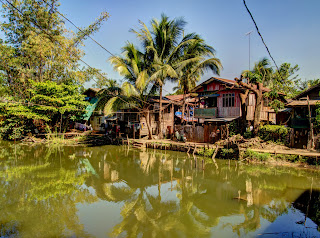“Ee,” the sweet lady at the San Francisco hotel in Bago,
creaked open a dubious smile as she divulged to me the secrets of how to see
all of Bago’s great sights without paying the hefty government entrance
fee. With the city map laid out on the
reception desk, she showed me which entrances would permit me to skirt around
ticket checkers or when to arrive so I show up before or after they do. While the government’s made some strides in
favor of its people over the last decade, it still has a long way to go before
it earn its people’s respect, and Ee and I both were happy to give them the
finger by cheating them out of admission costs.
On a rented bicycle, I raced ahead of the ticket checkers to
the Shwethalyang Buddha, a cheerful Buddha laid on his side, partially perched
on an arm. The soles of his feet are
absurdly ornate, but most remarkable about him is the fact that he’s 55 meters
long. His little finger is 3.05 meters
long and his upwardly curved lips run 2.29 meters across. A slightly smaller replica sits outdoors to
the south.
I got lost somewhere near the Bago River and let myself into
a monastery to look around. A kindly
monk by the name of Ottama invited me to sit with him and we talked at length
of the political and spiritual state of his country. He showed me clips on his smart phone of
Obama’s recent visit to Myanmar, greeted by Myanmar’s champion for democracy
Aung San Suu Kyi. Ottama walked me
through some of the Burmese pleasantries I hadn’t picked up yet (a few of my
mental tricks are Yao Ming Ali Baba for
hello and Jay-Z Ding Bat Day for thank
you). After he scribed in curvy
Burmese characters the word for vegetarian, he insisted that I join the monks
for their daily lunch and my face was promptly stuffed with rice, peanuts,
corn, okra, and this lovely salad made from tomatoes, green onions, and crispy
sun dried potatoes. Three dozen young
monks ate their rice and tried not to stare at the westerner. In Myanmar, there’s an expectation that young
men should spend two periods of their life participating in monastic life even
if they don’t become fulltime monks – once as adolescents and once again as
young adults.
Losing myself further in the outlying villages, I found
myself entertaining the locals simply by being there, and their looks of happy
curiosity were a welcome change from the burning penetrating stares I became
accustomed to in India. Freshly cut
watermelon rescued me from the afternoon sun.
Later, at another Stupa, one of the same name and design as
Yangon’s greatest, but 14 meters taller and completely devoid of westerners, I
was battling with timidity about taking pictures of monks when a couple started
taking pictures of me and we had fun gawking at each other and making
unintelligible attempts at communicating in each other’s languages. Outside, men young and old played a game we
could compare with hacky sack, suspending a hollow wicker soccer ball in the
air with their feet.
Many of the people here have pasty markings on their faces,
sometimes in deliberate patterns and sometimes in a nonchalant mess, and it
wasn’t until the third time someone told me it was sunscreen that I believed
it. Villagers peddled their wares from
large metal discs balanced on their heads and lovely young women shaded
themselves with umbrellas in not-quite-Chinese style dresses.
Now armed with that magic word gifted to me by Ottama, the
three syllables that formed a key – “Ta-da-loh” – I now felt brave enough to
venture forth from the tourist restaurants and join the English-less locals for
mealtime. “Ta-da, I’m a vegetarian,” and
with a courteous nod, my restaurant hosts would come back with plates of
surprises. First noodles with fried egg,
cauliflower, and spicy onions, later a tin with rice, potato soup, three
mystery sides of varying consistency and color, and so much tasty chai.
I had originally planned on venturing further south to enjoy
a jungle cruise and a day long pilgrimage to a golden rock sitting atop a
mountain, but my feet are still recovering from Nepal, I was unsure how much of
the cash I brought was viable by ridiculous Burmese standards, and I had
overheard people having great difficulty booking rooms and busses in the more
popular locations up north, so I felt behooved to cancel my southern itinerary
so that I would be better prepared for my time in the north. I booked it back to Yangon to be ready for
the great spectacles spiraling from Mandalay in the north.





1 comment:
Myanmartian is correct.
Post a Comment